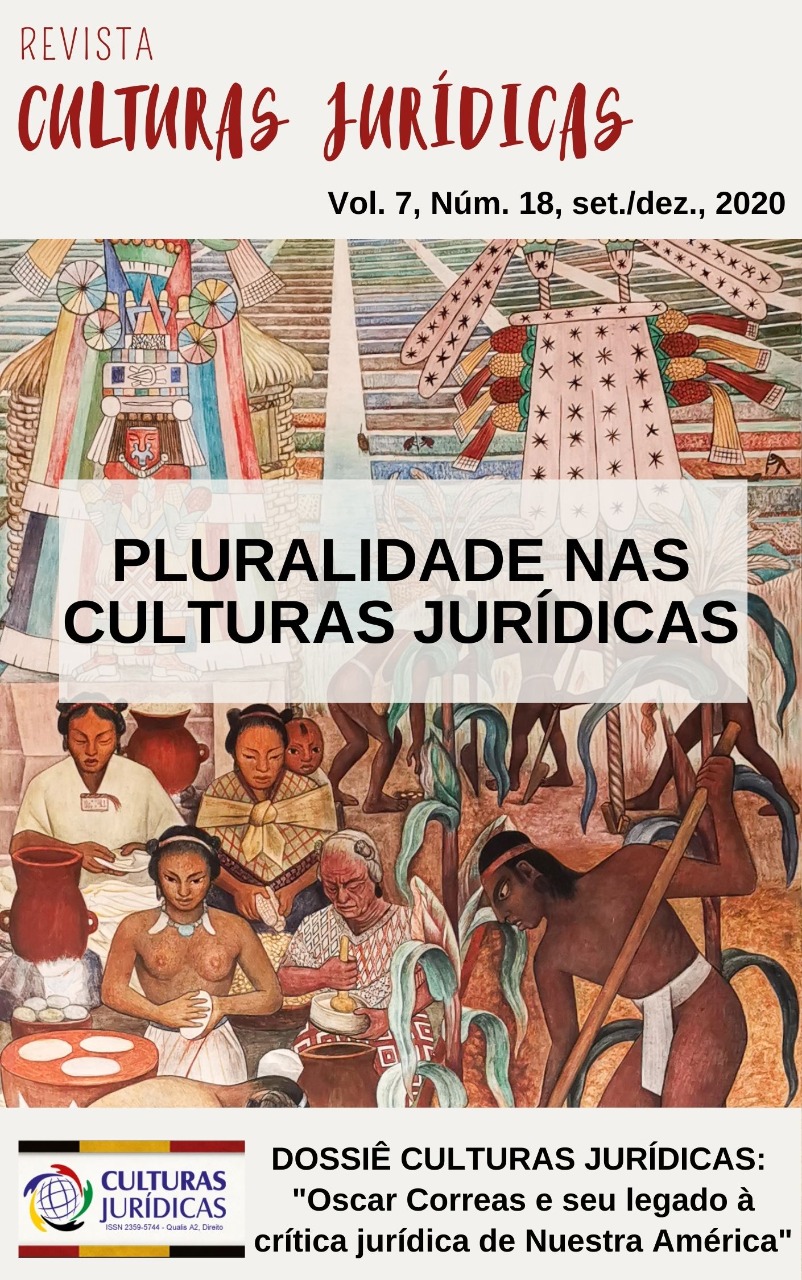O DIREITO AO TRABALHO PARA AMBULANTES EM CIDADES DO INTERIOR DE MATO GROSSO
Parole chiave:
Trabalho, Ambulantes, Regulamentação, Lei, Alienação./Keywords, Job, Ambulants, Regulation, Law, Alienation./Palabras clave, Trabajo, Regulación, Ley, Alienación.Abstract
Este artigo tem como objetivo principal analisar o contexto e o assujeitamento ideológico nos processos de edição de leis que regulamentam o comércio ambulante nas cidades matogrossenses de Barra do Bugres, Denise e Nova Olímpia. Para tanto foram utilizados os recursos da pesquisa de campo por meio de entrevistas com autoridades legislativas, ambulantes e comerciantes das localidades onde a pesquisa foi realizada, bem como a análise dos dispositivos das leis. A fundamentação foi calcada nas discussões sobre os conceitos de informalidade e direito ao trabalho nas sociedades capitalistas, bem como o conceito de ideologia na perspectiva do materialismo dialético. Foi possível constatar que a maioria dos entrevistados considera a questão do comércio ambulante a partir da vertente do discurso da legalidade, porém essa legalidade encontra-se diretamente ligada às questões do trabalho e da circulação de bens no universo capitalista sendo considerado mais uma forma de controle social das relações sociais e tributações possíveis para que saiam da “marginalidade” e assim, estarem autorizados a adentrar ao universo regulamentado. Iremos perceber, no caso da elaboração e efetivação dessas leis que, a ideologia dominante afeta os sujeitos no sentido de naturalizar, universalizar, racionalizar sua forma de interpretar e significar o mundo.
Downloads
Riferimenti bibliografici
BECKER, H. Conferência “A Escola de Chicago”. Mana, Rio de Janeiro, 1996.
BRANDÃO, H. N. Introdução à análise do discurso. Campinas: Editora da Unicamp, 1997.
BRASIL. Constituição da República Federativa do Brasil. 1988.
CORRÊA, R. L. O espaço urbano. 2 ed. São Paulo: Ed. Ática, 1993.
GRAMSCI, A. Concepção Dialética da História. Rio de Janeiro: Civilização Brasileira, 1978.
JAKOBSEN, K. A. A dimensão do trabalho informal na América Latina e no Brasil. In: Mapa do Trabalho Informal: Perfil socioeconômico dos trabalhadores informais na cidade de São Paulo. 1a edição. São Paulo: Editora Fundação Perseu Abramo,2001.
KOSIK, K. Dialética da totalidade concreta. In: Dialética do concreto. 2ª edição. São Paulo: Paz e Terra, 1976.
MARX, K. Contribuição à crítica da economia política. São Paulo: Martins Fontes, 2003.
MARX, K. O Capital. V I, tomo 2. São Paulo: Abril Cultural, 1984.
MARX, K; Engels, F. A ideologia alemã. 6 ed. São Paulo, 1987.
MARTINS, J de S. A exclusão social e a nova desigualdade. São Paulo: Paulus, 1997.
MATO GROSSO. Capítulo V: Da Ordem Econômica E Social, Seção I: Dos Princípios Gerais Da Atividade Econômica E Social, Art. 113. In: Lei Orgânica Do Município De Barra Do Bugres – MT. 1990.
MATO GROSSO. Lei n. 604 de 2011. Dispõe sobre a concessão de licença para vendedores ambulantes que comercializam produtos no município de Denise-MT. 2011.
MATO GROSSO. Lei n. 1028 de 19 de novembro de 2014. Dispõe sobre a concessão de licença para vendedores ambulantes e eventuais que comercializam produtos no município de Nova Olímpia-MT. 2014.
NORONHA, E. G. “Informal”, Ilegal, Injusto: Percepções Do Mercado de Trabalho No Brasil. Disponível em http://www.scielo.br/scielo.php?pid=S0102-69092003000300007&script=sci_abstract&tlng=pt . 2003. Acesso em 11 de julho de 2020.
PAMPLONA, João Batista. Auto-emprego, setor informal e Reestruturação produtiva. Disponível em http://portal.trt15.jus.br/documents/124965/125404/Rev15Art15.pdf/b0023038-0077-422c-87e6-4910b2aed361. 2001. Acesso em 11 de julho de 2020.
PICANÇO, Kátia. Ideologia. In: PARANÁ, Secretaria De Estado Da Educação. Sociologia para o ensino médio. Curitiba – Paraná. Disponível em http://www.educadores.diaadia.pr.gov.br/arquivos/File/livro_didatico/sociologia.pdf. 2016 Acesso em 30 de março de 2020.
POULANTZAS, N. As transformações atuais do Estado: a crise política e a crise do Estado. In: poulantzas, Nicos (org). O Estado em crise. Rio de Janeiro: Graal, 1977.
SINGER, Paul. Trabalho informal: origens e evolução o trabalho informal e a luta da classe operária. In: Mapa do Trabalho Informal: Perfil socioeconômico dos trabalhadores informais na cidade de São Paulo. Disponível em http://csbh.fpabramo.org.br/uploads/mapa_do_trabalho_informal.pdf . Acesso em 20 de abril de 2020.
SOARES, M. A. Trabalho informal: da funcionalidade à subsunção ao capital. Vitória da Conquista: Edições Uesb, 2008.
SOUSA, C. N. Trabalho “Informal”: alavanca e condição de existência da acumulação capitalista. 6º Colóquio Internacional Marx E Engels – Cemarx Unicamp – Campinas 3 - 6 De Novembro, 2009.
ZOPPI-FONTANA, M. G. Cidadãos Modernos: discurso e Representação Política. Campinas-SP: Editora da UNICAMP, 1998.
##submission.downloads##
Pubblicato
Versioni
- 2021-03-31 (2)
- 2020-11-12 (1)





